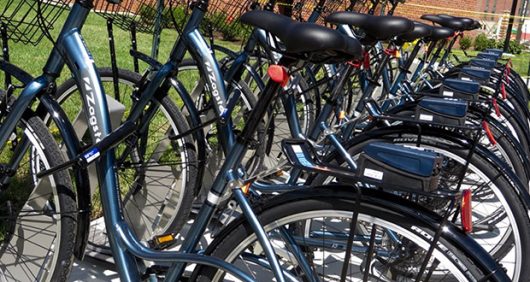
Portland State University’s Jennifer Dill is set to speak on her research regarding the role of bike transportation in modern cities. Credit: Lantern File Photo
Ohio State’s Center for Urban and Regional Analysis will host Jennifer Dill, an urban studies and planning professor at Portland State University, on Thursday to discuss findings from her recent research on bicycle transportation.
Dill will share her research on the factors that influence people’s decisions to use bicycles for transportation. The research is based on GPS data from more than 300 families in Portland, Oregon, and evaluations of separated bike lanes in five cities.
Harvey Miller, director of CURA, said Dill fit in perfectly with its three-part discussion series on transportation and health, and said he hopes her findings will start a conversation between OSU and the city of Columbus on bike safety.
“Study after study has shown that if you want people to bike, you need bike lanes so people will feel safe and comfortable,” Miller said. “We have to change the mindset and show people that biking is safe.”
Around campus, there are two protected bike lanes on Summit Street, one on North Fourth Street and plans for two more on Indianola Avenue, between Morse Road and East North Broadway Street.
Jeremy Mak, a third-year in mechanical engineering and president of the OSU Bike Club, said he anticipates that Dill’s talk will show not only the advantages of cycling, but also exemplify what the bike club is all about.
“Bike Club is a resource for students with bikes,” he said. “Our current initiative, right now, is to set up a space for people to learn bike maintenance. It’s all part of a greater scheme to make the university and student body more sustainable and eco-conscious.”
Mak also said he hopes the conveniences of riding bikes, compared with driving or taking an Uber, would be defined in the presentation.
“I would like to see more people cycling,” he said. “This means we must minimize the barriers people perceive of bikes, whether it be the thought of danger when riding them near cars, dealing with expenses of bikes, or concerns about theft. Ultimately, our hope is Dr. Dill’s talk will influence students’ transportation decisions in favor of bicycles.”
Ian Hayes, a second-year in finance who rides his bike to class every day, said he finds bikes advantageous not only on campus, but off campus as well.
“Bikes are a lot eco-friendlier than cars, so it’s difficult to grasp why others would choose driving a car to class over riding a bike,” he said. “I believe Dr. Dill’s research will show that it is possible to have a clean environment, and that could start with simply riding a bike.”
Miller also said that, as Columbus grows in population, it would be nice to see the population move in a healthy direction aided by bike transport.
“Columbus is growing every day, adding thousands of people,” Miller said. “We want people to see Columbus as a better community as we grow, and the research that Dr. Dill presents will hopefully lead us in the right direction.”
Dill’s Monday speech is set to take place in Derby Hall from noon to 1 p.m.


